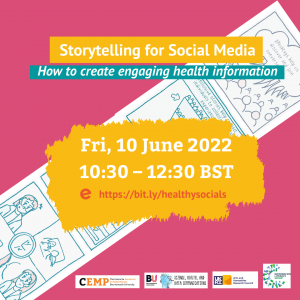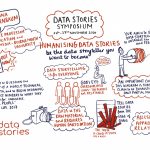How can we create evidence-based social media posts to better reach our audiences? What skills and tools do we need to tell informative stories?
Free Online Workshop
10th June 2022
10:30-12:30 BST

register: http://bit.ly/healthysocials
Creating social media posts that aim to build health or information literacy is challenging. It is one thing to get likes on a video of a cute dog dancing or beautiful hand-crafted artwork, it is another to develop reflective, empathetic understanding of complex phenomena in a bite-sized image or video.
To help guide you through the process, this workshop will introduce you to Professor Feigenbaum’s Pick N Mix strategy for social media storytelling. The Pick N Mix method is based on research findings from the UKRI/AHRC COVID-19 Rapid Response project that investigated the role of webcomics in public health messaging on social media during the first year of the pandemic. Our findings are further supported by contemporary research from the fields of media and communication studies, psychology and graphic medicine.
The strategies we introduce come from a variety of narrative communication techniques that have been shown to increase information retention, comprehension, relatability and empathy. Professor Feigenbaum has transformed these into easy-to-follow best practices that can be mixed with trending techniques and styles of social media storytelling to increase the reach and engagement of evidence-based content.
While there are hundreds of blogs and tutorial videos online that offer up advice on improving social media storytelling, reaching new audiences and increasing engagement with followers, many of these are focused on how to gain viewers on your instagram story. But if your goal is to build health and information literacy on social media, you need to go beyond traditional social media sales models to explore the unique needs of evidence-based communication. The tailored advice offered in this workshop is crucial when your aim is to increase health and information literacy or promote evidence-based behavioural change.

 Professor Feigenbaum and her team launch guide on social media storytelling for health literacy
Professor Feigenbaum and her team launch guide on social media storytelling for health literacy BU research explores the use of comic artistry and storytelling in public health information
BU research explores the use of comic artistry and storytelling in public health information Dr. Anna Feigenbaum delivers keynotes on Data Storytelling and COVID-19
Dr. Anna Feigenbaum delivers keynotes on Data Storytelling and COVID-19 SIA Game-Changing Concept: Sustainable Storytelling for Science & Health
SIA Game-Changing Concept: Sustainable Storytelling for Science & Health










 Beyond Academia: Exploring Career Options for Early Career Researchers – Online Workshop
Beyond Academia: Exploring Career Options for Early Career Researchers – Online Workshop UKCGE Recognised Research Supervision Programme: Deadline Approaching
UKCGE Recognised Research Supervision Programme: Deadline Approaching SPROUT: From Sustainable Research to Sustainable Research Lives
SPROUT: From Sustainable Research to Sustainable Research Lives BRIAN upgrade and new look
BRIAN upgrade and new look Seeing the fruits of your labour in Bangladesh
Seeing the fruits of your labour in Bangladesh ECR Funding Open Call: Research Culture & Community Grant – Apply now
ECR Funding Open Call: Research Culture & Community Grant – Apply now ECR Funding Open Call: Research Culture & Community Grant – Application Deadline Friday 12 December
ECR Funding Open Call: Research Culture & Community Grant – Application Deadline Friday 12 December MSCA Postdoctoral Fellowships 2025 Call
MSCA Postdoctoral Fellowships 2025 Call ERC Advanced Grant 2025 Webinar
ERC Advanced Grant 2025 Webinar Update on UKRO services
Update on UKRO services European research project exploring use of ‘virtual twins’ to better manage metabolic associated fatty liver disease
European research project exploring use of ‘virtual twins’ to better manage metabolic associated fatty liver disease